
The Thaumaturge Review
The Thaumaturge caught me by surprise. It is a turn-based RPG that I feel is greater than the sum of its parts, largely due to the care it puts into its worldbuilding and characters. Additionally, the game’s setting of 1905 Warsaw is not only relatively novel for games, but it’s handled delicately with a thoughtful acknowledgment of the realities that society faced in that time and place. Developer Fool’s Theory won me over throughout my 25-hour playthrough of The Thaumaturge.
I won’t claim to be super knowledgeable about Warsaw during this time period, but my basic understanding is that it was a time of immense political, social, and economic strife due to the ongoing Russian Revolution. Russian military occupation throughout the capital of Poland was naturally a contentious point for the locals, especially since poverty was already rampant due to prior historical events. To put it succinctly, things were not looking good for many people at the time.
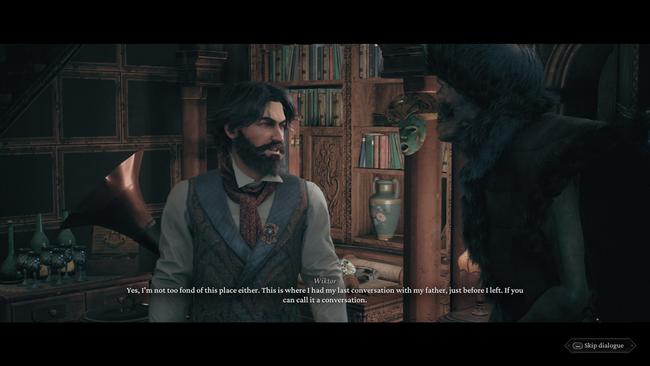
The Thaumaturge revolves around main character Wiktor Szulski. He has the power to forge a pact with devilish creatures called Salutors which define the practice of thaumaturgy. I’m sure this is tickling the brains of Shin Megami Tensei or Persona fans already. While The Thaumaturge carries some similar elements to those series, it largely takes reminiscent systems and mechanics in a different direction that allows it to carve out its own identity.
Players find a weakened Wiktor at the start of the game. In order to restore his powers, he banks his hopes on the infamous real-life historical figure Grigori Rasputin. After doing so, a small mystery at the start of The Thaumaturge serves as a vertical slice of its gameplay loop revolving around investigation, dialogue choices, and combat. The RPG properly opens up when Wiktor makes his way back to his hometown of Warsaw upon receiving news that his father passed away.
Traversal is done from an isometric point of view. Much of The Thaumaturge involves running between several Warsaw districts to search for clues that push forward a main or side quest. Normally, this doesn’t sound too flattering on paper but the sights and sounds of The Thaumaturge’s depiction of life in this time period help elevate what’s typically a mundane task in other games.
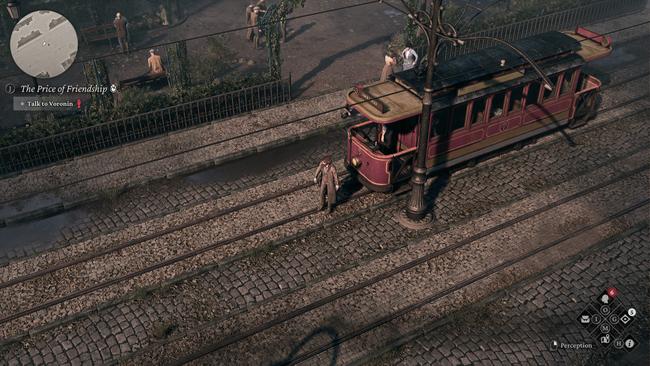
This feeds into the title’s numerous interactive collectibles such as notes, journals, newspapers, and other miscellaneous items. Fool’s Theory is a Polish studio, and I imagine a good chunk of its staff either are from Poland or have Polish roots in some form. Thus, this allows them to examine 1905 Warsaw under a lens that hits close to home. It’s easy to tell how extensively they researched this moment in time due to in-game passages attempting to encapsulate how people would express themselves or spread a message in a certain style to rally others to their cause.
Another element that further fleshes out the game’s world is a thaumaturge’s ability to pick up “traces” of someone’s personality based on lingering feelings and sentiments they’ve imparted onto an object that they have held previously. Although it’s a mechanical convenience from strictly a video game perspective, this does allow The Thaumaturge to greatly expand the characterization of its secondary cast through indirect means. Detecting and observing objects of interest that carry a person’s trace on them is a core part of its gameplay loop, because these ultimately form a conclusion to unlock a dialogue choice that can potentially move a quest forward in a certain direction.

I’ll provide a very basic, rudimentary made-up example. Let’s say Wiktor is trying to obtain more information on a man who apparently committed suicide. He naturally decides to investigate his home to obtain more insight that may lead to the truth of the matter. His wife is understandably grieving and is hesitant to open up to Wiktor.
In order to detect relevant clues, players press a button for Wiktor to snap his fingers and perceive them immediately; red dots will converge and highlight the item once Wiktor is near enough to the object of interest. Then, an object usually has at least one “test of perception” that is basically a statcheck to see if Wiktor has enough levels in the Heart, Mind, Deed, or Word stats to unravel the trace left on the object.
Relevant objects in this fictional instance are a half-sliced apple, a book about education, and a dusty uniform. The half-sliced apple requires a Deed level of 3 to uncover that the husband regularly served sliced apples to his wife. Meanwhile, a level 2 Mind allows Wiktor to discover that the husband read this book about educating all people regardless of social class or gender. Then a Heart level of 1 reveals to people that the husband once served in the Polish military and was fiercely loyal to his country.
Once all traces have been uncovered, Wiktor will then form a conclusion based on his findings. In this case, all signs point to a caring, sophisticated man who possessed values and circumstances that unlikely would add up to committing suicide. This conclusion would then open up a new, previously locked, dialogue option upon interacting with the grieving wife once more that could move the investigation forward.
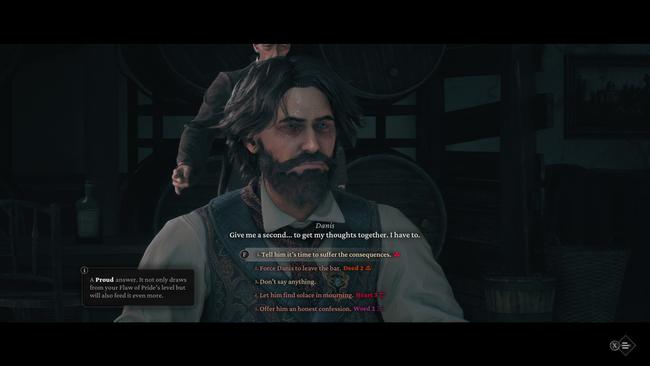
It’s a clever gameplay flow that allows Fool’s Theory to fully capitalize on a unique opportunity - educating its players about 1905 Warsaw through different perspectives without having character interactions outwardly spell it out to them. Instead, this more subdued avenue to provide insight is another way to convey the intentions and reasons of involved parties in quests without stilted or awkward expository dialogue.
Pressing a button to locate objects in the environment is a blessing and a curse. As people wander from one place to the next, there will also be hidden miscellaneous collectibles that will only be shown when Wiktor snaps to hone his perception; the snap shows the way to the marked objective, too. Therefore, I found myself constantly pressing this button whenever I traveled around to ensure I didn't miss anything.
These assorted collectibles when roaming about aren’t necessarily crucial or vital in most instances, though they can unlock hidden landmarks for Wiktor to check out and earn some experience points. The landmarks are merely a sketch that depicts a social activity that people indulged in upon visiting them. While I would’ve loved to see something more intricate from the development team, I can understand their restraint not to overextend their means of production and hone in on where the game excels.
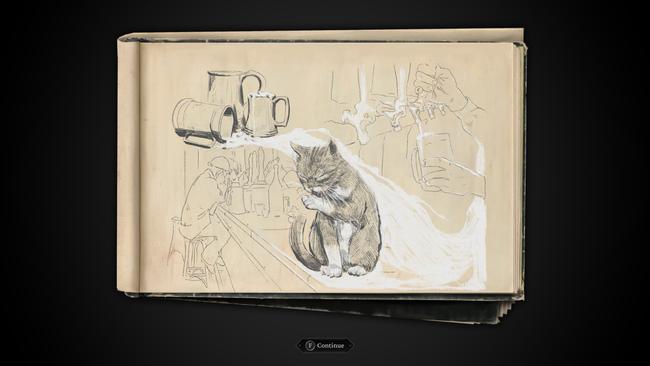
A large part of where The Thaumaturge shines is in its turn-based battle system. All of the battles in The Thaumaturge feature only two playable characters - Wiktor and the selected Salutor. Only Wiktor has a lifebar, while the Salutor does not.
The two face off against multiple enemies at once and the key to combat lines in a timeline system that surfaces the turn order of every single combatant in the field. It is up to players to mitigate as much incoming damage as possible, while mounting a calculated offense to dispatch enemies strategically.
Let’s talk about the basics first. Wiktor has a light and heavy attack; light attacks come out quickly, but do less damage. Heavy attacks can take out a respectable chunk of life at the expense of Wiktor needing an additional turn to execute it. He can also forgo dealing direct damage to an enemy’s lifebar and either inflict an ailment or sap their focus, instead. Depleting all of an enemy’s focus allows Wiktor and his Salutor access to a super attack; Wiktor has his own focus bar that players must maintain, too.
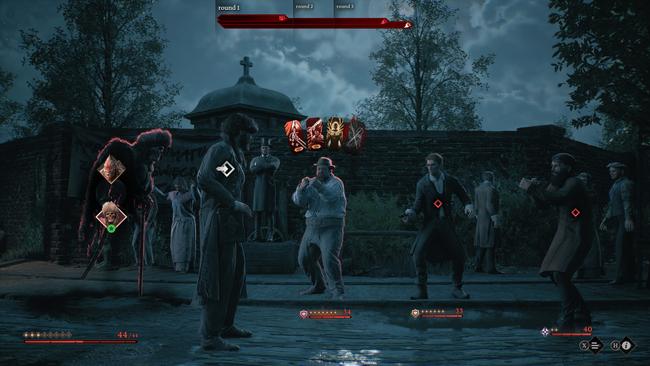
The meat of combat lies in The Thaumaturge’s flexible upgrade mechanics for Wiktor’s tools. As players progress the four skill tree branches, they’ll earn new upgrade modifiers that alter the property of his attacks. An early one that people will receive is a 50% chance to interrupt an incoming enemy attack. This can be freely slot in-and-out of his light, heavy, ailment, focus, or super attack. Since his light attack lets him act faster, I slotted this upgrade into it which gave him a chance to completely mitigate an enemy’s turn, so they’d have to wait additional turns to take another swing at Wiktor… unless I interrupt that as well.
Another example is an upgrade that reduces an enemy’s focus, if they have the Suffering status ailment on them. I decided to put that into Wiktor’s skill that drains a single focus point from a foe. Now if I executed that skill on an enemy with Suffering, it’ll take off two points of focus, instead. The aforementioned skill tree branches continually give health, focus, and skill upgrades to Wiktor. Early into the game, a lot of them will be blocked from progressing until players earn the associated Salutor demon to unlock the next part of the skill tree.
Each of Wiktor’s tools, aside from the super attack, can unlock additional attacks that can be unleashed on the following turn and these allow for more potent skill upgrades to be slotted into them.
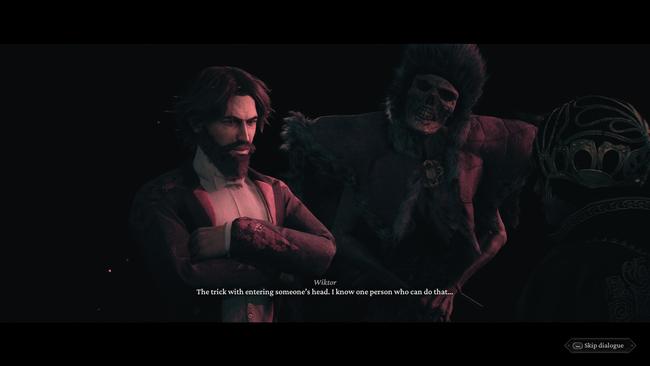
All of that is just for Wiktor alone. Salutors, on the other hand, don’t exhibit the malleable customization that Wiktor has access to. Instead, each Salutor has a unique moveset that carries different specializations. One is good at inflicting, extending, and stacking Suffering on the opposition. Wiktor’s trusty starting Salutor, Upyr, can heal Wiktor as it inflicts damage. Another handy Salutor can interrupt and slow enemy turns consistently.
Wiktor will always have access to all of his Salutors in battle once he has recruited them. He can switch to any of them on the fly once it’s a Salutor’s turn; switching to a different one to execute their attack does not consume a turn. All of the Salutors are based on European folklore with a focus on Slavic legends. The skeletal Upyr is from Slavic and Turkic mythology. Bukavac, a very early Salutor that people will obtain, is also another mythical creature with Slavic roots.
After a certain point, most enemies in battle will carry Trait modifiers that make them tougher to fight against. These Traits can take the form of reducing damage by 80%, unable to be inflicted by an ailment, immunity to abilities that slow their turn, and such. The game will communicate which specific Salutor(s) can disable them if those Salutors attack them once, so it adds an additional layer of strategy of balancing which targets the player should prioritize.
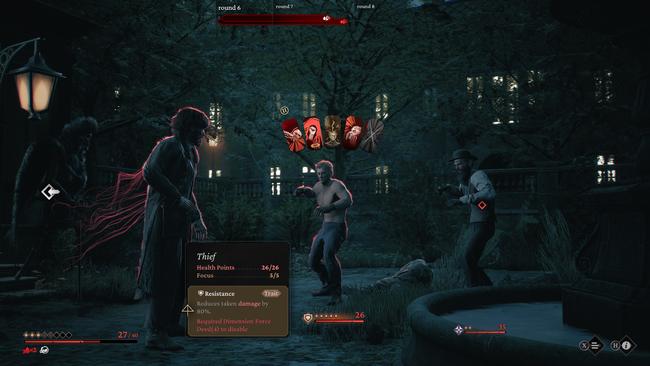
It’s a satisfying battle system that pushes people to plan their approach ahead of time. Enemies become quite vicious as they relentlessly inflict Wiktor with ailments as they assault his focus or health continually. In the game’s default Challenging (Hard) difficulty, Wiktor can easily die if he lets enemies act on a consistent basis.
With all that said, players don’t necessarily have to engage in combat to earn experience points. In fact, most of the experience points earned come from picking up collectibles, progressing, and completing quests - which don’t always resort to combat encounters depending on how players went about it. Thoroughly investigating clues to unlock different dialogue options can usually bypass what typically would have been a battle if Wiktor didn’t have the necessary choice options at his disposal.
This leads to another aspect of The Thaumaturge I appreciate - delicate ambiguity in quest design. There are certain factors in character interactions that lightly tip off players that their responses are making an impact, but what they’re impacting and to what extent is often difficult to discern. Some of Wiktor’s responses prompt the “This character will remember this” flag, though as to how or what that will affect down the line is intentionally left obfuscated. I personally would prefer that it didn’t have this prompt at all, yet I can understand that it’s there to signify to players that this specific response did affect something down the line.
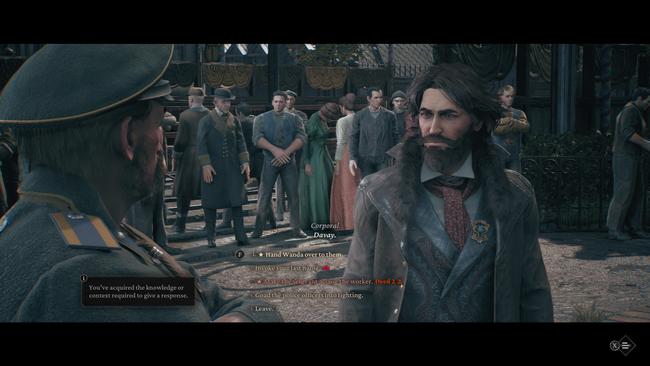
A fun implementation of this intentional ambiguity is when The Thaumaturge explicitly locks off a dialogue decision and tells people that as a result of their actions, that choice is locked. It doesn’t tell people how to open it up or which prior decision led to that result. There’s strength in a game indirectly telling its players that there is no “right” or “wrong” decision - merely choices and their consequences.
Salutors can even come into play as a possible resolution to some conflicts. Special dialogue decisions may open up if a player has enough levels in Heart, Mind, Deed, or Word to manipulate someone into a more “favorable” outcome. Thaumaturges can take advantage of a person’s state of mind to lightly hypnotize them to mentally bend their decision-making on a case-by-case basis.
Perhaps one of the most mysterious ambiguous elements is the Flaw system in this game. Salutors feed off of a person’s Flaw to sustain them and Wiktor’s Flaw, in exchange for his supernatural abilities, is pride. Some dialogue options bear a special mark indicating that selecting it will feed Wiktor’s Flaw, though it’s not apparent how this impacted the nature of future events in my playthrough. One of its most noticeable effects was that some key decisions were automatically made for me because Wiktor’s Flaw level was too high, so his pride took over.
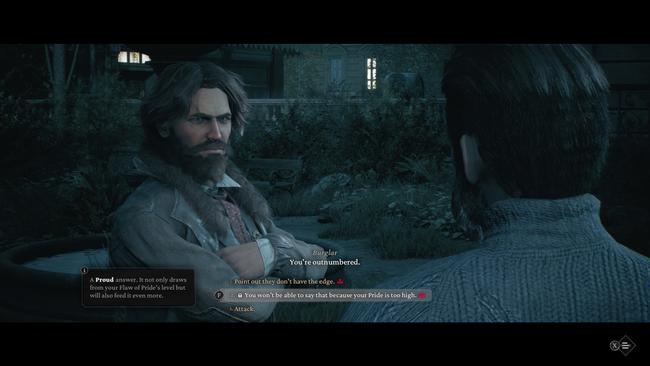
The Thaumaturge’s sound design and voice acting help bind everything together. Traversing through the streets of Warsaw is often moody as audibly downtrodden people roam around finding a way to survive another day. Dialogue exchanges often involve people who have a certain irritated tone to them. It helps ground this world despite the supernatural twist to it.
My biggest gripes with this RPG mostly stem from technical performance, bugs, and glitches I encountered. Of course, I expect most, if not all, of these to be ironed out by launch hopefully. There were occasional stuttering issues when running around. Loading into a new zone had models and various assets visibly placed in real-time for a split second, which was a bit awkward. In rare instances, models would glitch out and lead to comical times of their heads spasming rapidly. Sometimes running the game for more than an hour caused a memory leak on my PC that led to a high spike in RAM usage.
Due to its fairly grounded premise, there aren’t really any unique “boss” battles. The closest types of battles against a big enemy are against Salutors that Wiktor is on the verge of recruiting. These come in the form of taking place in an isolated space where Wiktor must triumph over waves of enemies to continually whittle down a Salutor’s health bar; the Salutor itself isn’t directly targetable. They do present challenging scenarios because they still fire off abilities that alter the state of combat, such as a Salutor being able to speed up enemy turns while inflicting Wiktor with the Slow ailment to make all of his actions take longer to fire off.
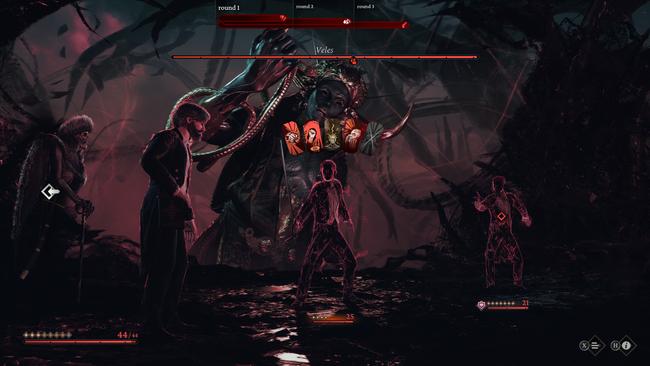
Developer Fool’s Theory has crafted a pretty solid turn-based RPG with The Thaumaturge. Its setting in 1905 Warsaw is fairly novel in games and at times, can feel like an intriguing, immersive documentary that educates its players on the harsh conditions during this time in history. The supernatural powers at protagonist Wiktor Szulski’s disposal pave the way to a satisfying battle system that carves out its own identity, despite looking like something out of Shin Megami Tensei or Persona upon first glance. There are technical rough edges here and there, but I firmly believe that RPG fans should definitely check out The Thaumaturge whenever they find time in this busy year of RPGs in 2024.